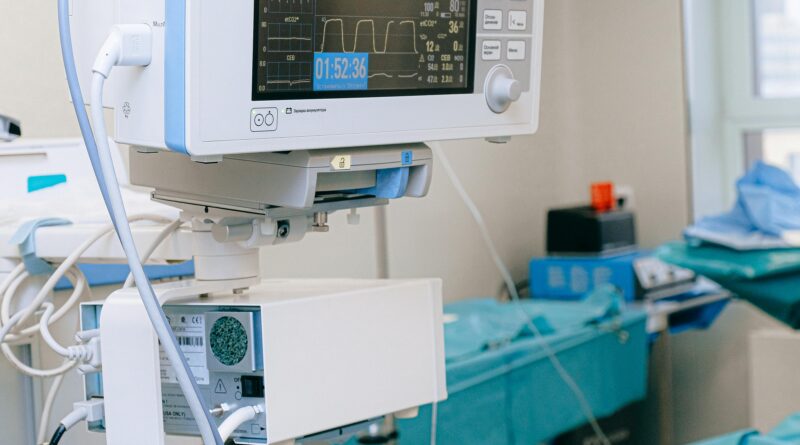Emerging Trends in Healthcare Technology
Emerging Trends in Healthcare Technology for 2024.Healthcare technology has been rapidly evolving, transforming the way medical services are delivered and accessed. As we step into 2024, several emerging trends are reshaping the landscape of healthcare, promising improved patient care, efficient management, and enhanced outcomes.
- Introduction to Healthcare Technology
- Telemedicine Revolutionizing Healthcare Delivery
- Artificial Intelligence in Diagnostics and Treatment
- Blockchain in Healthcare Management
- Wearable Health Devices and Remote Patient Monitoring
- Precision Medicine and Genomic Technology
- Virtual Reality for Therapeutic Interventions
- 5G Technology Enhancing Healthcare Infrastructure
- Cybersecurity in Healthcare Systems
- Robotics and Automation in Healthcare
- Augmented Reality for Medical Training
- Data Analytics and Predictive Modeling in Healthcare
- IoT Devices for Health Monitoring
- Personalized Health Apps and Platforms
- Conclusion: The Future of Healthcare Technology
Telemedicine Revolutionizing Healthcare Delivery
Telemedicine has emerged as a game-changer in healthcare delivery, especially in remote areas or during times of crisis like the recent global pandemic. It allows patients to consult with healthcare professionals remotely, leveraging technology such as video conferencing and mobile applications. Telemedicine not only improves access to healthcare but also reduces the burden on traditional healthcare facilities.
Artificial Intelligence in Diagnostics and Treatment
Artificial Intelligence (AI) is revolutionizing diagnostics and treatment protocols in healthcare. AI-powered algorithms can analyze medical data with unmatched speed and accuracy, assisting healthcare providers in diagnosing diseases, predicting outcomes, and personalizing treatment plans. From medical imaging interpretation to drug discovery, AI is streamlining various aspects of healthcare delivery.
Blockchain in Healthcare Management
Blockchain technology is gaining traction in healthcare management due to its inherent security and transparency features. Blockchain ensures the integrity and confidentiality of medical records, facilitates seamless sharing of data among healthcare providers, and enhances patient privacy. It also enables efficient management of pharmaceutical supply chains, reducing counterfeiting and ensuring authenticity.
Wearable Health Devices and Remote Patient Monitoring
Wearable health devices, coupled with remote patient monitoring systems, are empowering individuals to take charge of their health proactively. These devices can track vital signs, monitor activity levels, and provide real-time health data to both patients and healthcare providers. By enabling continuous monitoring, wearable devices facilitate early detection of health issues and support timely interventions.
Precision Medicine and Genomic Technology
Precision medicine, fueled by advancements in genomic technology, is revolutionizing healthcare by tailoring treatment plans to individual genetic profiles. Genomic sequencing allows healthcare providers to identify genetic variations that predispose individuals to certain diseases or influence their response to medications. This personalized approach to medicine holds the promise of more effective treatments and better outcomes.
Virtual Reality for Therapeutic Interventions
Virtual Reality (VR) technology is finding applications in various therapeutic interventions, particularly in pain management, rehabilitation, and mental health treatments. VR simulations can create immersive environments that aid in distraction therapy, exposure therapy, and relaxation techniques. By engaging multiple senses, VR enhances the effectiveness of therapeutic interventions and improves patient outcomes.
5G Technology Enhancing Healthcare Infrastructure
The advent of 5G technology is set to revolutionize healthcare infrastructure by enabling faster and more reliable connectivity. With its low latency and high bandwidth capabilities, 5G facilitates real-time communication between medical devices, supports telemedicine applications, and enhances the efficiency of remote surgeries and robotic procedures. 5G technology promises to transform the delivery of healthcare services, particularly in remote or underserved areas.
Cybersecurity in Healthcare Systems
As healthcare systems become increasingly digitized, cybersecurity emerges as a critical concern. The growing volume of sensitive medical data makes healthcare organizations prime targets for cyberattacks. Robust cybersecurity measures, including encryption, access controls, and threat detection systems, are essential to safeguard patient information and maintain the integrity of healthcare systems.
Robotics and Automation in Healthcare
Robotics and automation are revolutionizing various aspects of healthcare, from surgical procedures to patient care and administrative tasks. Robotic-assisted surgeries offer greater precision, minimal invasiveness, and faster recovery times. Automation streamlines repetitive tasks such as medication dispensing, inventory management, and appointment scheduling, freeing up healthcare professionals to focus on patient care.
Augmented Reality for Medical Training
Augmented Reality (AR) is transforming medical education and training by providing immersive learning experiences for healthcare professionals. AR simulations allow trainees to visualize complex anatomical structures, practice surgical procedures, and simulate medical scenarios in a risk-free environment. By enhancing hands-on training and spatial understanding, AR accelerates learning and skill development in the healthcare field.
Data Analytics and Predictive Modeling in Healthcare
Data analytics and predictive modeling are driving evidence-based decision-making in healthcare, optimizing resource allocation, and improving patient outcomes. By analyzing large datasets, healthcare organizations can identify trends, predict disease outbreaks, and optimize treatment protocols. Predictive modeling enables proactive interventions, reducing hospital readmissions and healthcare costs while improving overall quality of care.
IoT Devices for Health Monitoring
The Internet of Things (IoT) devices are revolutionizing health monitoring by connecting medical devices and wearables to the internet, enabling continuous data collection and remote monitoring. IoT devices can track vital signs, medication adherence, and environmental factors, providing valuable insights into patients’ health status. By facilitating early detection of health issues and enabling timely interventions, IoT devices contribute to improved patient outcomes and proactive healthcare management.
Personalized Health Apps and Platforms
Personalized health apps and platforms are empowering individuals to manage their health proactively through personalized insights, goal tracking, and behavior modification tools. These apps leverage data from wearable devices, genetic testing, and personal health records to deliver tailored recommendations for diet, exercise, medication adherence, and disease management. By fostering patient engagement and accountability, personalized health apps promote better health outcomes and preventive care.
Conclusion: The Future of Healthcare Technology
The future of healthcare technology is poised to be transformative, driven by innovations in telemedicine, artificial intelligence, blockchain, wearable devices, precision medicine, virtual reality, 5G technology, cybersecurity, robotics, augmented reality, data analytics, IoT devices, and personalized health apps. These emerging trends hold the promise of revolutionizing healthcare delivery, improving patient outcomes, and enhancing overall efficiency and accessibility of healthcare services.
FAQs
- What are the key emerging trends in healthcare technology for 2024?
- The key emerging trends include telemedicine, artificial intelligence, blockchain, wearable devices, precision medicine, virtual reality, 5G technology, cybersecurity, robotics, augmented reality, data analytics, IoT devices, and personalized health apps.
- How is telemedicine revolutionizing healthcare delivery?
- Telemedicine enables patients to consult with healthcare providers remotely, improving access to healthcare services, especially in remote areas or during crises like the recent pandemic.
- What role does artificial intelligence play in healthcare?
- Artificial intelligence assists in diagnostics, treatment planning, and personalized medicine by analyzing medical data with unmatched speed and accuracy, leading to more effective treatments and better patient outcomes.
- How does wearable technology contribute to healthcare?
- Wearable devices and remote monitoring systems empower individuals to monitor their health proactively by tracking vital signs, activity levels, and other health metrics in real-time, facilitating early detection of health issues and timely interventions.
- What is the significance of personalized health apps and platforms?
- Personalized health apps and platforms deliver tailored recommendations for diet, exercise, medication adherence, and disease management based on individual health data, promoting patient engagement and accountability for better health outcomes.
Exploring the Impact of Emerging Healthcare Technologies
Telemedicine: Bridging Gaps in Access to Healthcare
Telemedicine has emerged as a lifeline for patients in remote areas or those facing barriers to accessing traditional healthcare services. By leveraging telecommunications technology, patients can now consult with healthcare providers from the comfort of their homes. This not only saves time and resources but also ensures timely medical intervention, particularly for individuals with limited mobility or chronic conditions.
Artificial Intelligence: Transforming Diagnosis and Treatment
Artificial Intelligence (AI) is revolutionizing the healthcare landscape by augmenting the capabilities of medical professionals. AI-powered algorithms can analyze vast amounts of medical data, including imaging scans, patient records, and genomic information, to assist in diagnosing diseases and designing personalized treatment plans. By harnessing the power of AI, healthcare providers can improve diagnostic accuracy, optimize treatment outcomes, and enhance patient care.
Blockchain: Securing Health Data and Transactions
Blockchain technology is reshaping healthcare by addressing critical challenges related to data security, interoperability, and patient privacy. By providing a decentralized and tamper-proof ledger, blockchain ensures the integrity and confidentiality of health records while enabling seamless data sharing across healthcare networks. Additionally, blockchain-based smart contracts streamline administrative processes, such as insurance claims processing and supply chain management, leading to greater transparency and efficiency in healthcare operations.
Wearable Health Devices: Empowering Patients for Self-Care
The proliferation of wearable health devices, such as fitness trackers, smartwatches, and biosensors, has empowered individuals to take a proactive approach to their health and well-being. These devices can monitor various biometric parameters, such as heart rate, blood pressure, and activity levels, in real-time, providing users with valuable insights into their health status. By encouraging healthy behaviors and facilitating early detection of health issues, wearable devices play a crucial role in preventive healthcare and chronic disease management.
Precision Medicine: Personalizing Treatment Approaches
Precision medicine, also known as personalized or genomic medicine, aims to tailor medical treatments to the individual characteristics of each patient, including their genetic makeup, lifestyle, and environmental factors. By analyzing a patient’s genomic profile, healthcare providers can identify genetic predispositions to certain diseases, predict treatment responses, and optimize therapeutic interventions. This personalized approach to medicine holds the promise of improving treatment efficacy, minimizing adverse effects, and ultimately, enhancing patient outcomes.
Virtual Reality: Enhancing Patient Care and Therapeutic Interventions
Virtual Reality (VR) technology is transforming various aspects of healthcare, from patient care and rehabilitation to medical training and therapeutic interventions. VR simulations can create immersive environments that simulate real-life scenarios, allowing patients to undergo virtual therapies, such as exposure therapy for anxiety disorders or immersive distraction techniques during painful medical procedures. Moreover, VR-based medical training programs enable healthcare professionals to practice complex surgical procedures in a safe and controlled environment, leading to improved clinical skills and patient outcomes.
5G Technology: Revolutionizing Healthcare Connectivity
The rollout of 5G technology is poised to revolutionize healthcare connectivity by offering faster data speeds, lower latency, and greater network reliability. This enables real-time communication and data exchange between medical devices, healthcare providers, and patients, facilitating remote consultations, telemedicine services, and remote patient monitoring. Additionally, 5G technology supports the implementation of emerging technologies such as augmented reality (AR) and remote robotic surgeries, further enhancing the quality and accessibility of healthcare services.
Cybersecurity: Safeguarding Patient Data and Healthcare Systems
With the increasing digitization of healthcare data and the growing interconnectedness of medical devices and systems, cybersecurity has become a paramount concern for healthcare organizations. Cyberattacks targeting healthcare systems can compromise patient data, disrupt medical services, and even endanger patient safety. Therefore, robust cybersecurity measures, including encryption, access controls, and threat detection systems, are essential to safeguard patient information and maintain the integrity and availability of healthcare services.
Robotics and Automation: Enhancing Efficiency and Precision in Healthcare
Robotic technologies and automation are transforming various aspects of healthcare delivery, from surgical procedures and patient care to administrative tasks and logistics management. Robotic-assisted surgeries offer greater precision, minimal invasiveness, and faster recovery times compared to traditional surgical techniques, leading to improved patient outcomes and shorter hospital stays. Additionally, automation streamlines repetitive tasks such as medication dispensing, inventory management, and appointment scheduling, allowing healthcare professionals to focus more on patient care and clinical decision-making.
Augmented Reality: Revolutionizing Medical Training and Education
Augmented Reality (AR) has emerged as a powerful tool for medical training and education, offering immersive and interactive learning experiences for healthcare professionals. AR applications overlay digital information onto the user’s real-world environment, allowing trainees to visualize anatomical structures, practice surgical procedures, and simulate medical scenarios in a realistic and engaging manner. By enhancing spatial understanding and hands-on learning, AR accelerates skill acquisition and competency development in various medical specialties, ultimately leading to better patient care and clinical outcomes.
Data Analytics and Predictive Modeling: Driving Evidence-Based Healthcare
Data analytics and predictive modeling are revolutionizing healthcare by leveraging large volumes of medical data to inform clinical decision-making, optimize resource allocation, and improve patient outcomes. By analyzing electronic health records, medical imaging studies, and genomic data, healthcare organizations can identify patterns, trends, and correlations that inform evidence-based treatment protocols and preventive care strategies. Predictive modeling techniques enable proactive interventions, such as early disease detection, risk stratification, and personalized treatment planning, leading to improved patient outcomes and cost-effective healthcare delivery.
Internet of Things (IoT) Devices: Enabling Connected Healthcare
The Internet of Things (IoT) devices are revolutionizing healthcare by connecting medical devices, wearables, and sensors to the internet, enabling continuous data collection, remote monitoring, and real-time interventions. IoT devices can track vital signs, medication adherence, environmental factors, and patient activity levels, providing valuable insights into patients’ health status and enabling timely interventions. By facilitating early detection of health issues, remote patient monitoring, and personalized interventions, IoT devices contribute to improved patient outcomes, reduced hospital admissions, and enhanced quality of care.
Personalized Health Apps and Platforms: Empowering Patients for Self-Management
Personalized health apps and platforms empower individuals to manage their health proactively through personalized insights, goal tracking, and behavior modification tools. These apps leverage data from wearable devices, genetic testing, and personal health records to deliver tailored recommendations for diet, exercise, medication adherence, and disease management. By fostering patient engagement and accountability, personalized health apps promote healthier lifestyles, improve treatment adherence, and enhance overall well-being.

As we delve deeper into the digital era of healthcare, emerging technologies are poised to revolutionize the delivery and management of medical services. From telemedicine and artificial intelligence to blockchain, wearable devices, and precision medicine, these technologies hold the promise of improving patient outcomes, enhancing clinical workflows, and transforming the healthcare experience for both patients and providers. By embracing innovation and leveraging the power of technology, healthcare organizations can unlock new opportunities for delivering high-quality, accessible, and personalized care in the years ahead.
FAQs
- How do emerging technologies like telemedicine and artificial intelligence improve patient outcomes?
- Emerging technologies like telemedicine enable remote consultations and access to healthcare services, while artificial intelligence enhances diagnostic accuracy and personalized treatment planning, ultimately leading to improved patient outcomes and enhanced quality of care.
- What are the key benefits of wearable health devices and remote patient monitoring systems?
- Wearable health devices and remote patient monitoring systems empower individuals to monitor their health proactively, facilitating early detection of health issues, promoting preventive care, and enabling timely interventions, which ultimately lead to improved patient outcomes and enhanced well-being.
- How does precision medicine revolutionize treatment approaches?
- Precision medicine, which tailors medical treatments to the individual characteristics of each patient, including their genetic makeup and lifestyle factors, revolutionizes treatment approaches by optimizing therapeutic interventions, minimizing adverse effects, and ultimately improving treatment efficacy and patient outcomes.
- What role does cybersecurity play in safeguarding patient data and healthcare systems?
- Cybersecurity plays a critical role in safeguarding patient data and healthcare systems by protecting against cyberattacks that could compromise patient information, disrupt medical services, or endanger patient safety. Robust cybersecurity measures are essential to maintain the integrity, confidentiality, and availability of healthcare services.
- How do personalized health apps and platforms empower patients for self-management?
- Personalized health apps and platforms empower patients for self-management by delivering tailored recommendations for diet, exercise, medication adherence, and disease management based on individual health data. By fostering patient engagement and accountability, these apps promote healthier lifestyles, improve treatment adherence, and enhance overall well-being.
- What are the key advantages of augmented reality in medical training and education?
- Augmented reality offers immersive and interactive learning experiences for healthcare professionals by overlaying digital information onto the user’s real-world environment. This technology enhances spatial understanding, facilitates hands-on learning, and accelerates skill acquisition in various medical specialties, ultimately leading to better patient care and clinical outcomes.
- How do data analytics and predictive modeling drive evidence-based healthcare?
- Data analytics and predictive modeling leverage large volumes of medical data to inform clinical decision-making, optimize resource allocation, and improve patient outcomes. By analyzing electronic health records, medical imaging studies, and genomic data, healthcare organizations can identify patterns, trends, and correlations that inform evidence-based treatment protocols and preventive care strategies.
- What are the key benefits of Internet of Things (IoT) devices in healthcare?
- Internet of Things (IoT) devices enable continuous data collection, remote monitoring, and real-time interventions by connecting medical devices, wearables, and sensors to the internet. These devices track vital signs, medication adherence, environmental factors, and patient activity levels, providing valuable insights into patients’ health status and enabling timely interventions, ultimately leading to improved patient outcomes and enhanced quality of care.
- How do personalized health apps and platforms empower patients for self-management?
- Personalized health apps and platforms empower individuals to manage their health proactively through personalized insights, goal tracking, and behavior modification tools. These apps leverage data from wearable devices, genetic testing, and personal health records to deliver tailored recommendations for diet, exercise, medication adherence, and disease management. By fostering patient engagement and accountability, personalized health apps promote healthier lifestyles, improve treatment adherence, and enhance overall well-being.
- What role do emerging technologies play in shaping the future of healthcare?
- Emerging technologies such as telemedicine, artificial intelligence, blockchain, wearable devices, precision medicine, virtual reality, 5G technology, cybersecurity, robotics, augmented reality, data analytics, IoT devices, and personalized health apps are poised to revolutionize the delivery and management of medical services. These technologies hold the promise of improving patient outcomes, enhancing clinical workflows, and transforming the healthcare experience for both patients and providers by unlocking new opportunities for delivering high-quality, accessible, and personalized care.
In conclusion, the future of healthcare technology is filled with promise and potential, driven by innovative solutions that leverage the power of emerging technologies. By embracing these advancements and incorporating them into healthcare delivery and management, we can create a more efficient, accessible, and patient-centric healthcare system that improves outcomes, enhances quality of care, and empowers individuals to take control of their health and well-being.
As we look towards the future of healthcare technology in 2024 and beyond, it’s essential to recognize the transformative impact these emerging trends will have on the healthcare industry. From improving access to care through telemedicine to revolutionizing treatment approaches with precision medicine and enhancing patient engagement with personalized health apps, the possibilities are endless.
In addition to improving patient outcomes, these technologies also hold the potential to address longstanding challenges within the healthcare system, such as reducing healthcare disparities, optimizing resource allocation, and enhancing operational efficiency. By leveraging the power of data, connectivity, and innovation, healthcare organizations can usher in a new era of healthcare delivery that prioritizes quality, accessibility, and patient-centered care.
However, it’s important to acknowledge that with great innovation comes great responsibility. As we embrace these emerging technologies, it’s crucial to prioritize patient privacy, data security, and ethical considerations. Healthcare organizations must ensure robust cybersecurity measures are in place to safeguard patient data, comply with regulatory requirements, and uphold the trust and confidence of patients and stakeholders.
Furthermore, as technology continues to evolve, so too must healthcare professionals. Continuous education and training are essential to equip healthcare providers with the skills and knowledge needed to leverage these technologies effectively and deliver high-quality care in an increasingly digital landscape.
In conclusion, the emerging trends in healthcare technology for 2024 represent a paradigm shift in how we approach healthcare delivery and management. By harnessing the power of telemedicine, artificial intelligence, blockchain, wearable devices, precision medicine, and other innovative solutions, we can create a healthcare ecosystem that is more accessible, efficient, and patient-centered than ever before.
In summary, the landscape of healthcare technology in 2024 is characterized by unprecedented innovation and advancement. From telemedicine to precision medicine and beyond, these emerging trends are reshaping the way healthcare is delivered, accessed, and managed.
As we navigate this evolving landscape, it’s crucial for healthcare stakeholders to embrace these technologies responsibly and ethically. This includes ensuring patient privacy and data security, fostering a culture of continuous learning and adaptation among healthcare professionals, and prioritizing patient-centered care in all aspects of healthcare delivery.
By leveraging the power of emerging technologies while upholding these principles, we can unlock the full potential of healthcare technology to improve patient outcomes, enhance healthcare access and delivery, and ultimately, transform the way we experience healthcare in the years to come.
As we move forward into the future, it’s essential to recognize the role of collaboration and innovation in driving healthcare technology forward. By fostering partnerships between healthcare organizations, technology companies, policymakers, and other stakeholders, we can collectively address the challenges and opportunities presented by these emerging trends.
Moreover, ongoing research and development are crucial to furthering the capabilities of healthcare technology and unlocking new possibilities for improving patient care and outcomes. By investing in research, innovation, and education, we can ensure that the future of healthcare technology continues to evolve and meet the needs of patients and providers alike.
In conclusion, the emerging trends in healthcare technology for 2024 represent a significant step forward in the evolution of healthcare delivery and management. By embracing these innovations responsibly and collaboratively, we can create a future where healthcare is more accessible, efficient, and patient-centered than ever before.
In conclusion, the emerging trends in healthcare technology for 2024 are poised to revolutionize the way we approach healthcare delivery, access, and management. From telemedicine and artificial intelligence to precision medicine and wearable devices, these innovations hold the promise of improving patient outcomes, enhancing efficiency, and transforming the overall healthcare experience.
However, it’s essential to approach these technologies with careful consideration of ethical, privacy, and security implications. Healthcare organizations must prioritize patient safety and data protection while leveraging the full potential of these advancements.
By embracing innovation, fostering collaboration, and upholding ethical standards, we can create a future where healthcare is more accessible, efficient, and patient-centered than ever before.
Looking ahead, it’s evident that the future of healthcare technology is filled with promise and potential. As we navigate the ever-evolving landscape of healthcare, it’s essential to remain adaptable, innovative, and patient-focused.
By continuing to embrace emerging technologies, foster collaboration, and prioritize patient care and safety, we can shape a future where healthcare is more accessible, efficient, and personalized than ever before.
In closing, the emerging trends in healthcare technology for 2024 offer a glimpse into the transformative power of innovation. By harnessing these advancements responsibly and ethically, we can pave the way for a healthier and more equitable future for all.




